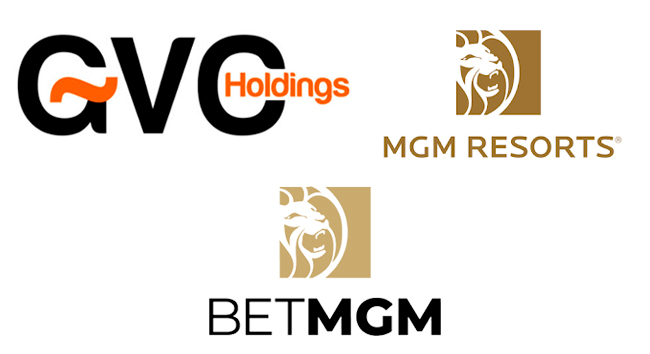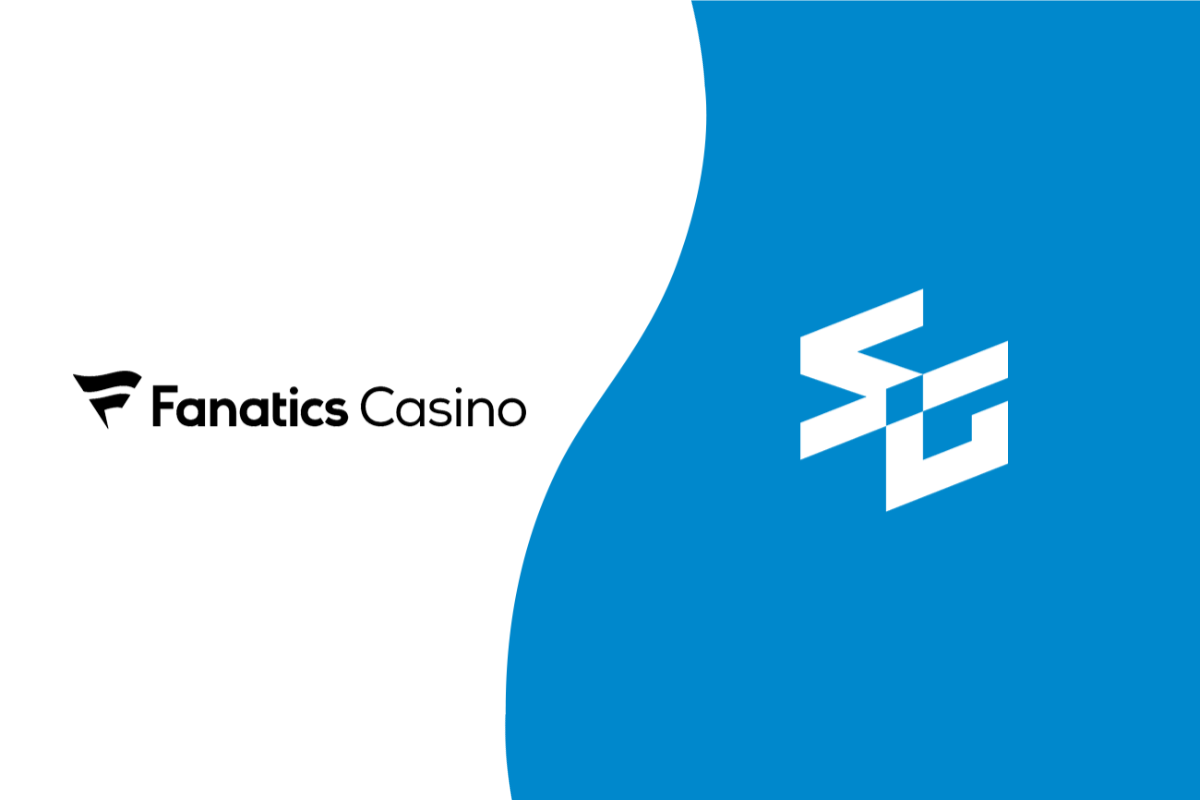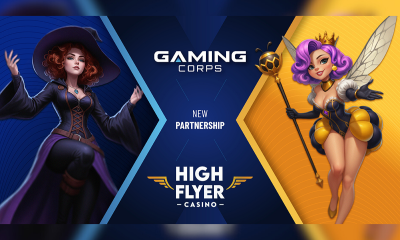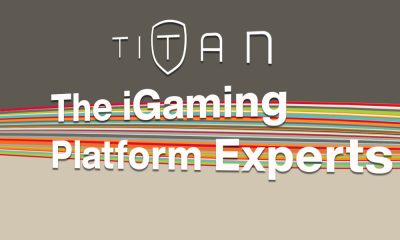Gambling in the USA
MGM Resorts International And GVC Holdings Commit To Second Round Of Investment In US Sports Betting And Online Gaming Platform BetMGM

ROAR Digital, LLC – the US sports betting and online gaming company operating as BetMGM and owned jointly by MGM Resorts International and GVC Holdings – announced that its shareholders have committed to a second round of investment, bringing the total to $450 million. This increase follows MGM Resorts’ and GVC’s total initial commitment of $200 million and underpins their commitment to BetMGM becoming a leading player in the rapidly growing US sports betting and iGaming markets. These two rounds of investment provide the Company with over $370 million of investable capital at present.
Since its launch in 2018, the Company has made significant progress and is on track to operate in 11 states by the end of 2020. In addition to the financial strength of both its shareholders, the Company benefits from MGM Resorts’ leading brand, iconic physical properties, and loyal customer base, along with GVC’s proprietary, globally-proven technology.
“We launched this business to combine the best of MGM Resorts and GVC, and establish BetMGM as a leading brand in the US sports betting and iGaming markets,” said Adam Greenblatt, CEO of ROAR Digital, LLC. “With broad market access secured, our long-term technology foundations now firmly established, and a high performing team in place, this further unequivocal support from our two shareholders will ensure we can achieve leading market positions in this exciting industry that is growing even faster than our initial expectations.”
Greenblatt concluded, “BetMGM is on track to generate over $130 million of net revenues this year predominantly from iGaming in New Jersey given the impact of COVID-19. With the return of sports and our growing operations across the US, we anticipate rapid growth in the coming year.”
The Company’s success will be built on its four core strategic tenets, each of which provide distinct competitive advantages:
1. Market access:
The Company has already secured market access to 19 states1 which together reach approximately 50% of the US population. It has active operations in seven states with four more expected to launch by year end 2020.
With a best-in-class web, mobile, and desktop sportsbook platform as well as supporting MGM Resorts’ brick and mortar sportsbook destinations, BetMGM’s exclusive betting engine allows sports fans to place bets quickly, safely and easily in every channel. This superior experience, together with the Company’s demonstrated strength in player onboarding and management as well as GVC’s global sportsbook expertise, places BetMGM in a very strong position to achieve a leading share in the US sports betting market, estimated to achieve revenues of approximately $8.5 billion2 by 2025.
In iGaming, the Company has already achieved a leading market position in New Jersey with approximately 18% market share3 and gross gaming revenue growth of 210% in the second quarter of 2020 compared to the prior year quarter. The US iGaming market is estimated to achieve revenues of approximately $6.9 billion2 by 2025, and the Company believes that it can replicate this leading market position in other jurisdictions, as additional states legalize iGaming in the future.
2. Customer reach:
The Company is uniquely positioned to access a wide range of customers through its partners, affiliates and its omni-channel approach.
MGM Resorts has an established portfolio of market-leading properties across the US, giving BetMGM access to market to millions of engaged and brand loyal customers. M life Rewards, MGM Resorts’ loyalty program, has over 34 million members, of which approximately 18% are located in states planned to be live on the BetMGM platform by the end of 2020.
The Company is integrating M life Rewards in support of an omni-channel strategy such that BetMGM customers will become M life Members to earn and enjoy Tier status, recognition and rewards based on their sports and iGaming wagers. Likewise, existing M life Rewards members will now have a new way to earn Tier Credits and status based on sports and iGaming wagers placed with BetMGM. This integration is expected to drive new customer acquisition, omni-channel activity, as well as ongoing customer loyalty and engagement for BetMGM.
In addition, the Company has exclusive partnerships with Yahoo Sports and Buffalo Wild Wings. Upon the imminent return of sports, the Company is looking forward to launching BetMGM to Yahoo’s 64 million monthly active users, including one of the largest fantasy sports player bases in the US.
3. Product and technology:
BetMGM has exclusive access to GVC’s proven, highly flexible, and highly scalable in-house technology platform, which gives it world-class infrastructure, tools and content in both iGaming and sports betting.
Access to proprietary and vertically integrated technology is a key strategic advantage in delivering a leading sports and gaming proposition to customers. Core benefits include speed of development, reducing time to market on innovative new features, platform stability and flexibility, and ease of use. The technology platform has been fully optimized ahead of the return of US sports, with the Company enjoying support from a team of over 2,000 IT specialists, including a dedicated team servicing the BetMGM product.
The Company also benefits from the maturity and rich features of GVC’s sports product, including an immersive in-play betting experience across an exhaustive range of sports as well as a range of industry leading bet management features such as Bet Rewards, Odds Boosts, Build-A-Bet, Edit-My-Bet and Auto Cash Out features. Combined with state-of-the-art engagement capabilities, best-in-class frictionless customer experience, as well as powerful omni-channel journeys and cross sell capabilities this gives BetMGM significant technological and experiential advantages. Internally developed, exclusive iGaming content has been key to BetMGM’s success in New Jersey. The current strength of product and technology, combined with the pace of improvement and innovation, strongly supports the Company’s leadership ambitions.
4. People:
In addition to being able to draw on the outstanding talent within both MGM Resorts and GVC, the Company has built an industry-leading team across a range of functions, including marketing, technology, product development, and customer engagement and retention.
The team has been hand-picked and combines deep industry experience from around the globe with US specialists in areas where local expertise is vital such as VIP, product UI/UX and customer research.
The US-based trading leadership team has a track-record of building trading operations and winning market share from incumbent players in the sports betting market. The approach and techniques further support the Company’s growth agenda.
“Sports betting and iGaming are fundamental to what MGM Resorts does best,” said Bill Hornbuckle, Acting CEO & President of MGM Resorts. “Our investment in ROAR is a demonstration of our continued excitement about the unique benefit of offering unforgettable, premier entertainment experiences to millions of our loyal guests directly through BetMGM. We believe this competitive advantage places BetMGM at the forefront of the most dynamic growth opportunity in all of US gaming and will ultimately deliver meaningful long-term value for our shareholders.”
“These are exciting times for BetMGM, as it continues to expand its iGaming business while also offering customers an outstanding sports betting experience as live sports returns to the US,” said Kenny Alexander, CEO of GVC. “We see enormous potential for the US market and are delighted to have such a strong foothold in it through our partnership with MGM Resorts. Our stake in BetMGM is, by some distance, the most important and exciting investment that GVC has ever made. We are absolutely committed to ensuring that the Company has the funding and technical resources needed to achieve long-term market leadership, whilst delivering significant value for shareholders.”
SOURCE MGM Resorts International
Powered by WPeMatico
Gambling in the USA
S Gaming ignites US expansion with Fanatics Casino partnership

S Gaming, the fast-growing developer of highly entertaining online slots and casino games, has taken another major step in its US expansion strategy by securing a partnership with leading operator Fanatics Casino.
As part of the agreement, Fanatics Casino will exclusively roll out S Gaming’s standout title, Triple 7 Jackpot, across regulated iGaming markets including New Jersey, Pennsylvania, West Virginia, and Michigan.
What Makes Triple 7 Jackpot Stand Out?
Triple 7 Jackpot delivers a classic slot experience infused with vibrant neon energy. At the heart of the game is its signature Triple 7 feature, which remains visible on-screen throughout gameplay. Players can unlock this feature by landing three Bonus 7 symbols in a single spin.
Once activated, the feature awards one bonus spin and a chance to land the impressive 500x Jackpot prize, adding significant win potential to the experience.
In addition, players can trigger Free Spins by landing three Scatter symbols during the base game, awarding seven Free Games and further opportunities to boost winnings.
Strengthening a Growing US Presence
The partnership with Fanatics Casino marks another milestone in S Gaming’s ambitious US growth strategy. The studio’s focus on sustainable entertainment and accessible, casual gameplay is already resonating with American players.
Charles Mott, CEO and Co-Founder of S Gaming, highlighted the importance of the deal:
“Fanatics Casino needs no introduction and is one of the powerhouse brands in the regulated US market. We’re thrilled to see Triple 7 Jackpot added to its casino lobby and to bring the game to players in New Jersey, Pennsylvania, West Virginia, and Michigan for the first time.”
Mott also noted that the company now works with two major US operators—Fanatics and BetMGM—with additional partnerships expected in the coming months.
Enhancing the Fanatics Casino Portfolio
Fanatics Casino views the collaboration as part of its ongoing strategy to elevate its game offering.
Kieron Shaw, Senior Manager at Fanatics Casino, commented:
“We’re committed to expanding our portfolio to enhance the player experience, which is why we continue to partner with innovative studios like S Gaming. Their focus on fun, combined with strong win potential, brings something fresh and exciting to our platform.”
With this latest launch, S Gaming continues to cement its position in the competitive US iGaming landscape, leveraging premium partnerships to deliver engaging slot experiences to players nationwide.
The post S Gaming ignites US expansion with Fanatics Casino partnership appeared first on Eastern European Gaming | Global iGaming & Tech Intelligence Hub.
Arizona
Arizona Department of Gaming Marks Fifth Super Bowl of Legal Sports Betting — November Wagers Top $965M

The Arizona Department of Gaming today highlighted a major milestone: the upcoming Super Bowl will be the fifth played under Arizona’s legal, state-regulated sports wagering framework. Since regulated event wagering launched in 2021, Arizona’s oversight—guided by state law and Tribal-State Compacts—has aimed to protect consumers, preserve integrity, and generate public revenue.
Key November 2025 figures: strong wagering growth
In its latest monthly report, the Department said Arizona bettors wagered approximately $965 million on sports and events in November 2025 — about a 7.5% increase versus November 2024. The state collected roughly $5.5 million in privilege fees for the month.* Fiscal year-to-date privilege fees total $26.3 million (about $25.7M from event wagering and $637,399 from fantasy sports).
Arizona also recorded its highest monthly event wagering in October 2025 with $967,141,269, and the second-highest in November 2025 with $965,233,844.*
Regulated framework and consumer protections
Arizona’s regulated model requires licensed operators to follow statutory rules, Tribal-State Compacts, and ongoing regulatory oversight. The Department conducts audits, compliance reviews, and integrity controls designed to prevent fraud and illegal activity. Licensed event wagering operators remit privilege fees, calculated as a percentage of gaming revenue — with 90% of those fees directed to Arizona’s General Fund to support state programs and priorities.
There are currently fourteen licensed event wagering operators approved to offer wagering in Arizona, each subject to ongoing Department review and potential audit adjustments.
Responsible play and support resources
The Department emphasizes the importance of using state-licensed event wagering and fantasy sports apps or retail locations. For guidance and safety tips, players are encouraged to visit Check Your Bet at gaming.az.gov/checkyourbet.
For individuals and families affected by problem gambling, the Department’s Division of Problem Gambling offers confidential, subsidized treatment and resources statewide at problemgambling.az.com.
* Disclaimer: Monthly operator figures are self-reported and subject to adjustment after Department audits and review. The Department does not guarantee the final accuracy of the self-reported totals.
The post Arizona Department of Gaming Marks Fifth Super Bowl of Legal Sports Betting — November Wagers Top $965M appeared first on Eastern European Gaming | Global iGaming & Tech Intelligence Hub.
Gambling in the USA
Arizona Department of Gaming Marks Fifth Super Bowl of Legal, State Regulated Sports Betting

Department additionally releases November event wagering and fantasy sports numbers
The Arizona Department of Gaming (Department) today recognized that the upcoming Super Bowl will mark the fifth Super Bowl conducted under Arizona’s legal, state-regulated sports wagering framework. This milestone reflects five years of regulated event wagering operating pursuant to Arizona state law, Tribal-State Compacts, and comprehensive regulatory oversight designed to protect consumers, uphold integrity, and generate public revenue.
“The regulated gaming market in Arizona plays a critical role in ensuring a safe environment for sports wagering – offering responsible entertainment options to millions of Arizonans,” said Jackie Johnson, Department Director. “During major events such as the Super Bowl, regulated gaming supports economic activity, sustains industry jobs, and generates consistent funding that helps finance important local and state programs and priorities.”
Since the launch of regulated event wagering in 2021, the Department has built and executed a regulatory system that serves Arizonans through alignment with consumer protections, responsible gaming, fraud prevention, and more— across major sporting events and marquee games such as the Super Bowl.
The Department oversees licensed event wagering operators through ongoing regulatory processes, audits, and compliance reviews. These efforts are designed to ensure adherence to statutory requirements, responsible gaming standards, and integrity controls, including protections against fraud and illegal activity. Licensed operators are also required to remit privilege fees to the State of Arizona, which are deposited into the state’s General Fund.
As enacted by the Arizona State Legislature and through the 2021 Amended and Restated Tribal-State Compacts, the State of Arizona allows for eligible operators to apply to the Department for an event wagering license. Today, there are fourteen licensed event wagering operators. Event wagering licensees pay privilege fees to the state, calculated as a percentage of gaming revenue, with 90 percent of the fees flowing to the state’s General Fund.
On a monthly basis, the Arizona Department of Gaming releases event wagering and fantasy sports figures. Today, it released its latest reporting of monthly figures – covering November 2025, in which bettors in Arizona wagered approximately $965 million on sports and events. This represents an approximate 7.5 percent increase when compared to November of 2024. The state collected approximately $5.5 million in privilege fees in the month.*
To view the full report, see: gaming.az.gov/resources/reports. Fiscal year-to-date regulated event wagering and fantasy sports privilege fees in Arizona have totaled $26.3 million, including $25.7 million in event wagering and $637,399 in fantasy sports.*
In its five-plus years since the launch of sports betting, the Department saw its highest event wagering activity recorded in October 2025 with a total of $967,141,269 – and the second highest record in November 2025 with a total of $965,233,844.*
To learn about why it’s important to play with a state-licensed event wagering or fantasy sports app or retail location this Super Bowl, visit Check Your Bet at gaming.az.gov/checkyourbet, an initiative of the Arizona Department of Gaming.
The Department’s Division of Problem Gambling provides resources statewide to individuals and families impacted by problem gambling. Services include access to confidential, subsidized treatment options. Visit problemgambling.az.com to learn more.
* Disclaimer: These numbers are self-reported by the operators; as such, these numbers are subject to adjustments after audit and review by the Arizona Department of Gaming. The Department makes no assurances regarding the accuracy of these numbers.
The post Arizona Department of Gaming Marks Fifth Super Bowl of Legal, State Regulated Sports Betting appeared first on Americas iGaming & Sports Betting News.
-

 Edvardas Sadovskis CPO at ICONIC217 days ago
Edvardas Sadovskis CPO at ICONIC217 days agoICONIC21 Reimagines Myth: Medusa vs. Perseus — The Stone Duel
-

 Africa7 days ago
Africa7 days agoAmusnet Announces Strategic Partnership with Betway
-

 Canada7 days ago
Canada7 days agoGaming Corps takes flight in Ontario with High Flyer Casino partnership
-

 CRM6 days ago
CRM6 days agoTitan 3.0 Launch Marks Finnplay’s Biggest Platform Overhaul
-

 Christer Fahlstedt6 days ago
Christer Fahlstedt6 days agoPaf has halved its loss limit since 2018
-

 Canada7 days ago
Canada7 days agoCasinoCanada and GG.BET Forge Strategic Alliance
-

 Latest News5 days ago
Latest News5 days agoWinSpirit’s UnValentine’s Day: A New Take on February Engagement
-

 Bryndís Hrafnkelsdóttir6 days ago
Bryndís Hrafnkelsdóttir6 days agoNOVOVISION Implemented at the University of Iceland Lottery

















